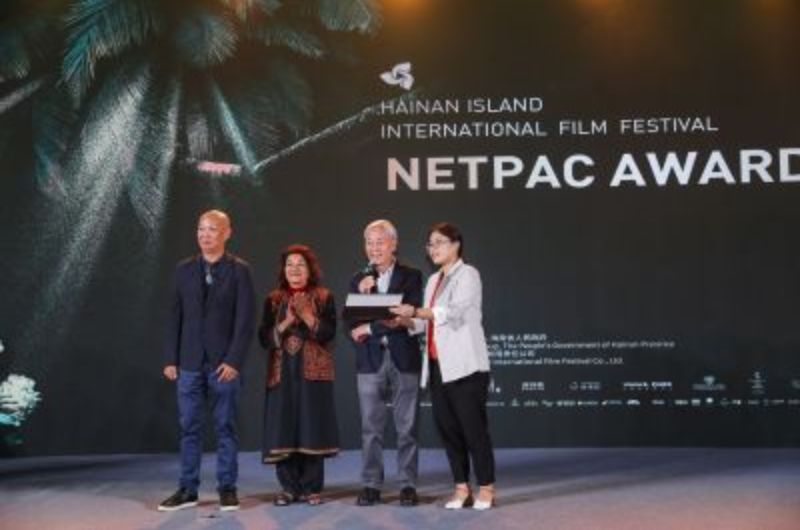Shoma A. Chatterji goes behind the scenes to analyse a documentary by Supriya Suri
Aruna Vasudev, the Mother of Asian Cinema, a documentary film by Supriya Suri, is making waves across film festivals in India and beyond. Suri is a cinephile who was a regular at film festivals in Delhi. Aruna, along with like-minded people, had founded the Osian Film Festival, which was an annual affair in Delhi and left a void when it ceased.
“I hope, through this film, I can bring Aruna’s enthusiasm and the impact she had on several lives on screen and highlight what she has done for Asian cinema,” says Suri. “She created a platform that opened up not just Asian cinema for me but also gave budding filmmakers an opportunity to learn, grow and connect with fellow filmmakers,” she adds.
Growing up in New Delhi, Aruna Vasudev has had a deep impact on many budding film journalists, writers and filmmakers across Asia. She built a lasting connection between the cinema of India and that of other South Asian countries. A French newspaper bestowed on her the title of Mother of Asian Cinema and that’s how the film gets its name. Aruna Vasudev, The Mother of Asian Cinema, brings together her journey as a film critic, cinema activist and an impresario.
Aruna was the key person responsible for founding and nurturing three major organisations – Cinemaya, Netpac and Cinefan Film Festival. “This documentary traces her roots from her humble origins in undivided British India, to the corridors of cinematic universe,” adds Suri about her choice of subject for her film.
“I knew Aruna as a film festival and Netpac founder before I actually met her, but I did not have an in-depth insight into what she had done with the organisations and Cinemaya as a magazine. Once I started accessing her archived materials, I realised she had done so much more for cinema. Going through old issues of Cinemaya meant reading about the history of many new waves that happened, such as the Iranian New Wave, Taiwan New Wave, Hong Kong Cinema etc, which Cinemaya alone had recorded through interviews, reviews and essays in English,” says Suri.
But there was a big challenge. “Talking to Aruna, I realised she had already forgotten important pieces of the history, which made it extremely challenging for me to put together a factual career timeline – it meant that I had to find others to fill in the memory gaps,” she explains. So how did she get the idea to make such a film?
“I was working on a short fiction film about the dead cinephile culture in Delhi, and I had asked Aruna to act as herself. While shooting the fictional scene, the realisation kicked in that a legend stands before me yet to be documented. I took it up as my responsibility to make a documentary on an Indian who has done so much to put Asian cinema on the global map.” For her research, Suri had to go through several issues of Cinemaya, records of Cinefan Film Festivals, documented conversations of Netpac, pictures, videos, etc, which took about a year. Aruna’s friends in the industry agreed to be part of the research.
Talking about the intensive and extensive research her subject demanded, Suri explains, “I think preparation and knowing your subject thoroughly can give you a better sense of filming irrespective of who you are recording. On the sets, there was not Aruna alone but also people like Stanley Kwan, Adoor Gopalakrishnan, Mohsen Makhmalbaf, who I had to interview. While you do think about veterans judging you, perhaps over the questions, knowing cinema, its history and proper research helped me break those barriers and put me at ease faster than I had imagined.”
What are her takeaways from the film? “Holding old issues of Cinemaya, looking at how the film festival world functioned, I pondered about how digital transformation has changed many things over the years. For example, film festivals earlier relied on film prints but it’s now done digitally. COVID also has changed the way we view films, so the future direction of film festivals and bringing the community together becomes even more important. Also, reading film criticism has changed my perspective and taught me a lot about cinema. In the age of social media and visual world I often think about the role of text and film criticism and if it’ll hold good for Gen Z.” Suri also feels that lot more documentaries need to be produced about Indian Masters from the film industry and their contribution to the world cinema for a global audience.
The film is very crisply and objectively made. Not going into the details of Aruna’s private life, it focusses on her evolution as a journalist and festival organiser. It may appear to be filled with talking heads, with Aruna taking the lead, but on hindsight, this is the most honest way of presenting and documenting her life and work. The film has been screened at Jaffjogja, Indonesia, KIFF, Dhaka International Film Festival, International Documentary and Short Film Festival, Kerala, and the Imagine India International Film Festival, Spain.
July – September 2022



 from Webdoux
from Webdoux